Sociological Concepts and Theories in Australian Health Care
VerifiedAdded on 2023/06/05
|10
|3290
|92
Essay
AI Summary
This essay explores the application of sociological concepts and theories to the Australian healthcare system. It examines traditional disparities between indigenous and non-indigenous populations, highlighting issues of racism and socioeconomic disadvantage. The essay discusses functionalism, conflict theory, and symbolic interactionism, analyzing their impact on healthcare practitioners and the overall system. It addresses the consequences of these sociological perspectives, including limitations on patient responses and ethical considerations related to power dynamics. The essay also touches on criticisms of functionalism and the development of policies aimed at ensuring equality in healthcare access in Australia. Desklib offers this and many other solved assignments for students.
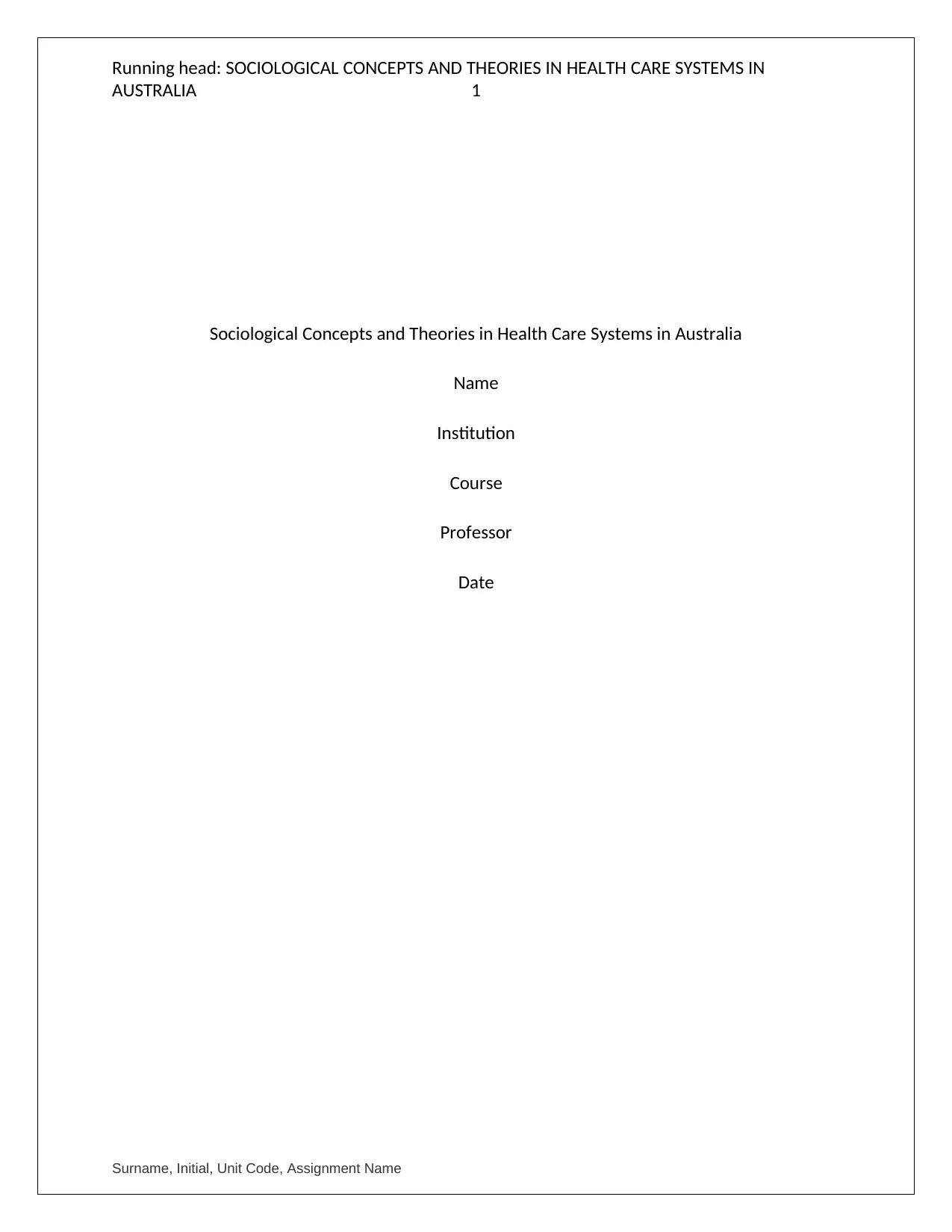
Running head: SOCIOLOGICAL CONCEPTS AND THEORIES IN HEALTH CARE SYSTEMS IN
AUSTRALIA 1
Sociological Concepts and Theories in Health Care Systems in Australia
Name
Institution
Course
Professor
Date
Surname, Initial, Unit Code, Assignment Name
AUSTRALIA 1
Sociological Concepts and Theories in Health Care Systems in Australia
Name
Institution
Course
Professor
Date
Surname, Initial, Unit Code, Assignment Name
Paraphrase This Document
Need a fresh take? Get an instant paraphrase of this document with our AI Paraphraser
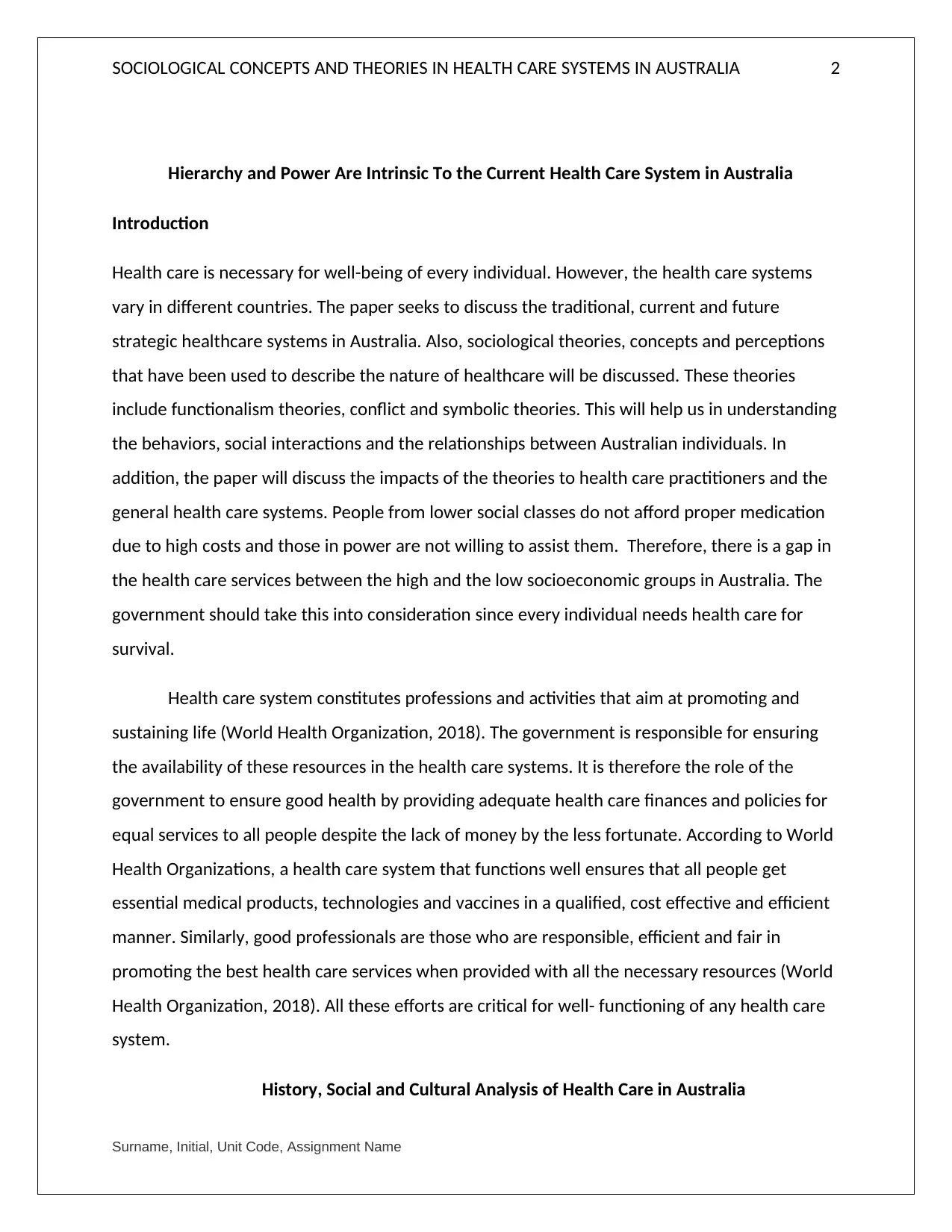
SOCIOLOGICAL CONCEPTS AND THEORIES IN HEALTH CARE SYSTEMS IN AUSTRALIA 2
Hierarchy and Power Are Intrinsic To the Current Health Care System in Australia
Introduction
Health care is necessary for well-being of every individual. However, the health care systems
vary in different countries. The paper seeks to discuss the traditional, current and future
strategic healthcare systems in Australia. Also, sociological theories, concepts and perceptions
that have been used to describe the nature of healthcare will be discussed. These theories
include functionalism theories, conflict and symbolic theories. This will help us in understanding
the behaviors, social interactions and the relationships between Australian individuals. In
addition, the paper will discuss the impacts of the theories to health care practitioners and the
general health care systems. People from lower social classes do not afford proper medication
due to high costs and those in power are not willing to assist them. Therefore, there is a gap in
the health care services between the high and the low socioeconomic groups in Australia. The
government should take this into consideration since every individual needs health care for
survival.
Health care system constitutes professions and activities that aim at promoting and
sustaining life (World Health Organization, 2018). The government is responsible for ensuring
the availability of these resources in the health care systems. It is therefore the role of the
government to ensure good health by providing adequate health care finances and policies for
equal services to all people despite the lack of money by the less fortunate. According to World
Health Organizations, a health care system that functions well ensures that all people get
essential medical products, technologies and vaccines in a qualified, cost effective and efficient
manner. Similarly, good professionals are those who are responsible, efficient and fair in
promoting the best health care services when provided with all the necessary resources (World
Health Organization, 2018). All these efforts are critical for well- functioning of any health care
system.
History, Social and Cultural Analysis of Health Care in Australia
Surname, Initial, Unit Code, Assignment Name
Hierarchy and Power Are Intrinsic To the Current Health Care System in Australia
Introduction
Health care is necessary for well-being of every individual. However, the health care systems
vary in different countries. The paper seeks to discuss the traditional, current and future
strategic healthcare systems in Australia. Also, sociological theories, concepts and perceptions
that have been used to describe the nature of healthcare will be discussed. These theories
include functionalism theories, conflict and symbolic theories. This will help us in understanding
the behaviors, social interactions and the relationships between Australian individuals. In
addition, the paper will discuss the impacts of the theories to health care practitioners and the
general health care systems. People from lower social classes do not afford proper medication
due to high costs and those in power are not willing to assist them. Therefore, there is a gap in
the health care services between the high and the low socioeconomic groups in Australia. The
government should take this into consideration since every individual needs health care for
survival.
Health care system constitutes professions and activities that aim at promoting and
sustaining life (World Health Organization, 2018). The government is responsible for ensuring
the availability of these resources in the health care systems. It is therefore the role of the
government to ensure good health by providing adequate health care finances and policies for
equal services to all people despite the lack of money by the less fortunate. According to World
Health Organizations, a health care system that functions well ensures that all people get
essential medical products, technologies and vaccines in a qualified, cost effective and efficient
manner. Similarly, good professionals are those who are responsible, efficient and fair in
promoting the best health care services when provided with all the necessary resources (World
Health Organization, 2018). All these efforts are critical for well- functioning of any health care
system.
History, Social and Cultural Analysis of Health Care in Australia
Surname, Initial, Unit Code, Assignment Name
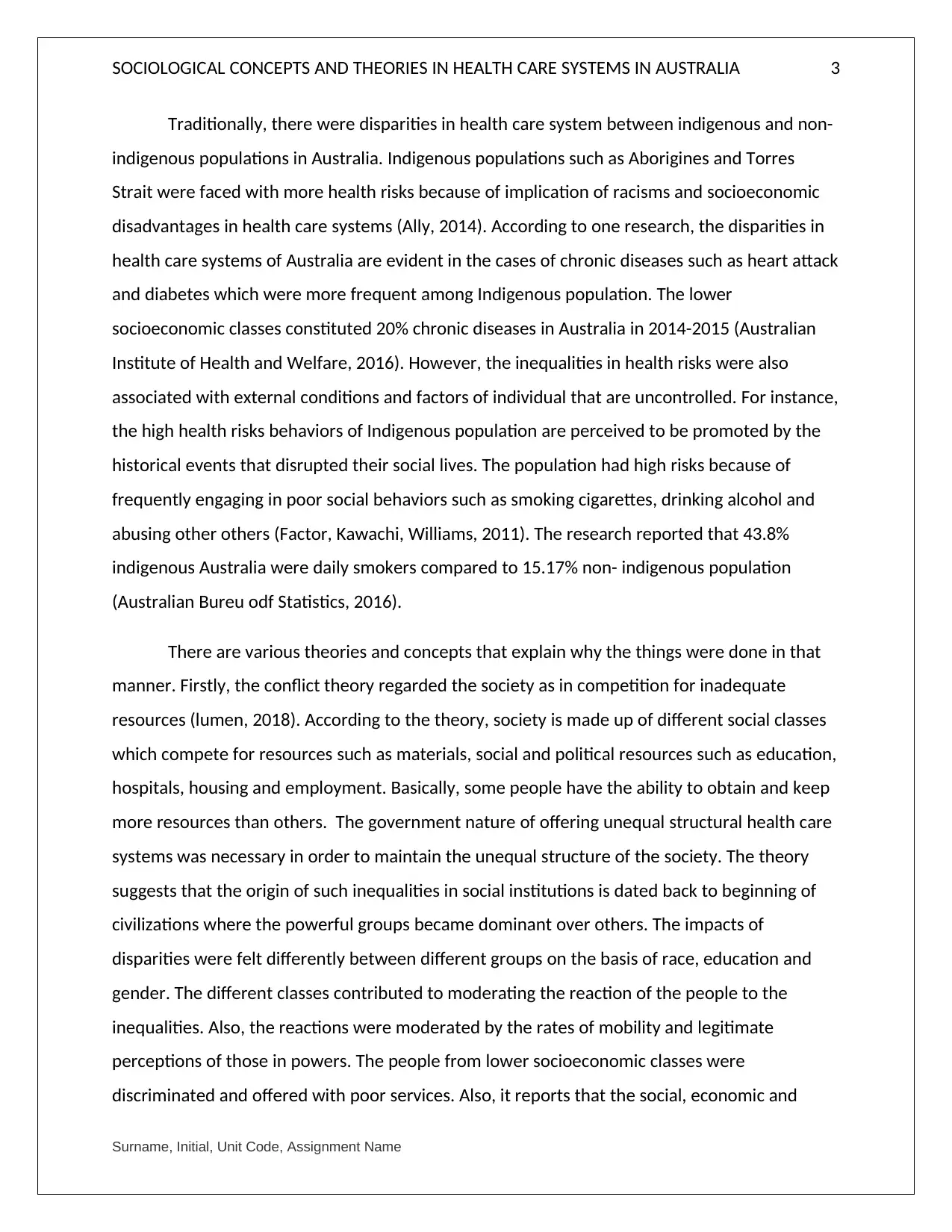
SOCIOLOGICAL CONCEPTS AND THEORIES IN HEALTH CARE SYSTEMS IN AUSTRALIA 3
Traditionally, there were disparities in health care system between indigenous and non-
indigenous populations in Australia. Indigenous populations such as Aborigines and Torres
Strait were faced with more health risks because of implication of racisms and socioeconomic
disadvantages in health care systems (Ally, 2014). According to one research, the disparities in
health care systems of Australia are evident in the cases of chronic diseases such as heart attack
and diabetes which were more frequent among Indigenous population. The lower
socioeconomic classes constituted 20% chronic diseases in Australia in 2014-2015 (Australian
Institute of Health and Welfare, 2016). However, the inequalities in health risks were also
associated with external conditions and factors of individual that are uncontrolled. For instance,
the high health risks behaviors of Indigenous population are perceived to be promoted by the
historical events that disrupted their social lives. The population had high risks because of
frequently engaging in poor social behaviors such as smoking cigarettes, drinking alcohol and
abusing other others (Factor, Kawachi, Williams, 2011). The research reported that 43.8%
indigenous Australia were daily smokers compared to 15.17% non- indigenous population
(Australian Bureu odf Statistics, 2016).
There are various theories and concepts that explain why the things were done in that
manner. Firstly, the conflict theory regarded the society as in competition for inadequate
resources (lumen, 2018). According to the theory, society is made up of different social classes
which compete for resources such as materials, social and political resources such as education,
hospitals, housing and employment. Basically, some people have the ability to obtain and keep
more resources than others. The government nature of offering unequal structural health care
systems was necessary in order to maintain the unequal structure of the society. The theory
suggests that the origin of such inequalities in social institutions is dated back to beginning of
civilizations where the powerful groups became dominant over others. The impacts of
disparities were felt differently between different groups on the basis of race, education and
gender. The different classes contributed to moderating the reaction of the people to the
inequalities. Also, the reactions were moderated by the rates of mobility and legitimate
perceptions of those in powers. The people from lower socioeconomic classes were
discriminated and offered with poor services. Also, it reports that the social, economic and
Surname, Initial, Unit Code, Assignment Name
Traditionally, there were disparities in health care system between indigenous and non-
indigenous populations in Australia. Indigenous populations such as Aborigines and Torres
Strait were faced with more health risks because of implication of racisms and socioeconomic
disadvantages in health care systems (Ally, 2014). According to one research, the disparities in
health care systems of Australia are evident in the cases of chronic diseases such as heart attack
and diabetes which were more frequent among Indigenous population. The lower
socioeconomic classes constituted 20% chronic diseases in Australia in 2014-2015 (Australian
Institute of Health and Welfare, 2016). However, the inequalities in health risks were also
associated with external conditions and factors of individual that are uncontrolled. For instance,
the high health risks behaviors of Indigenous population are perceived to be promoted by the
historical events that disrupted their social lives. The population had high risks because of
frequently engaging in poor social behaviors such as smoking cigarettes, drinking alcohol and
abusing other others (Factor, Kawachi, Williams, 2011). The research reported that 43.8%
indigenous Australia were daily smokers compared to 15.17% non- indigenous population
(Australian Bureu odf Statistics, 2016).
There are various theories and concepts that explain why the things were done in that
manner. Firstly, the conflict theory regarded the society as in competition for inadequate
resources (lumen, 2018). According to the theory, society is made up of different social classes
which compete for resources such as materials, social and political resources such as education,
hospitals, housing and employment. Basically, some people have the ability to obtain and keep
more resources than others. The government nature of offering unequal structural health care
systems was necessary in order to maintain the unequal structure of the society. The theory
suggests that the origin of such inequalities in social institutions is dated back to beginning of
civilizations where the powerful groups became dominant over others. The impacts of
disparities were felt differently between different groups on the basis of race, education and
gender. The different classes contributed to moderating the reaction of the people to the
inequalities. Also, the reactions were moderated by the rates of mobility and legitimate
perceptions of those in powers. The people from lower socioeconomic classes were
discriminated and offered with poor services. Also, it reports that the social, economic and
Surname, Initial, Unit Code, Assignment Name
⊘ This is a preview!⊘
Do you want full access?
Subscribe today to unlock all pages.

Trusted by 1+ million students worldwide
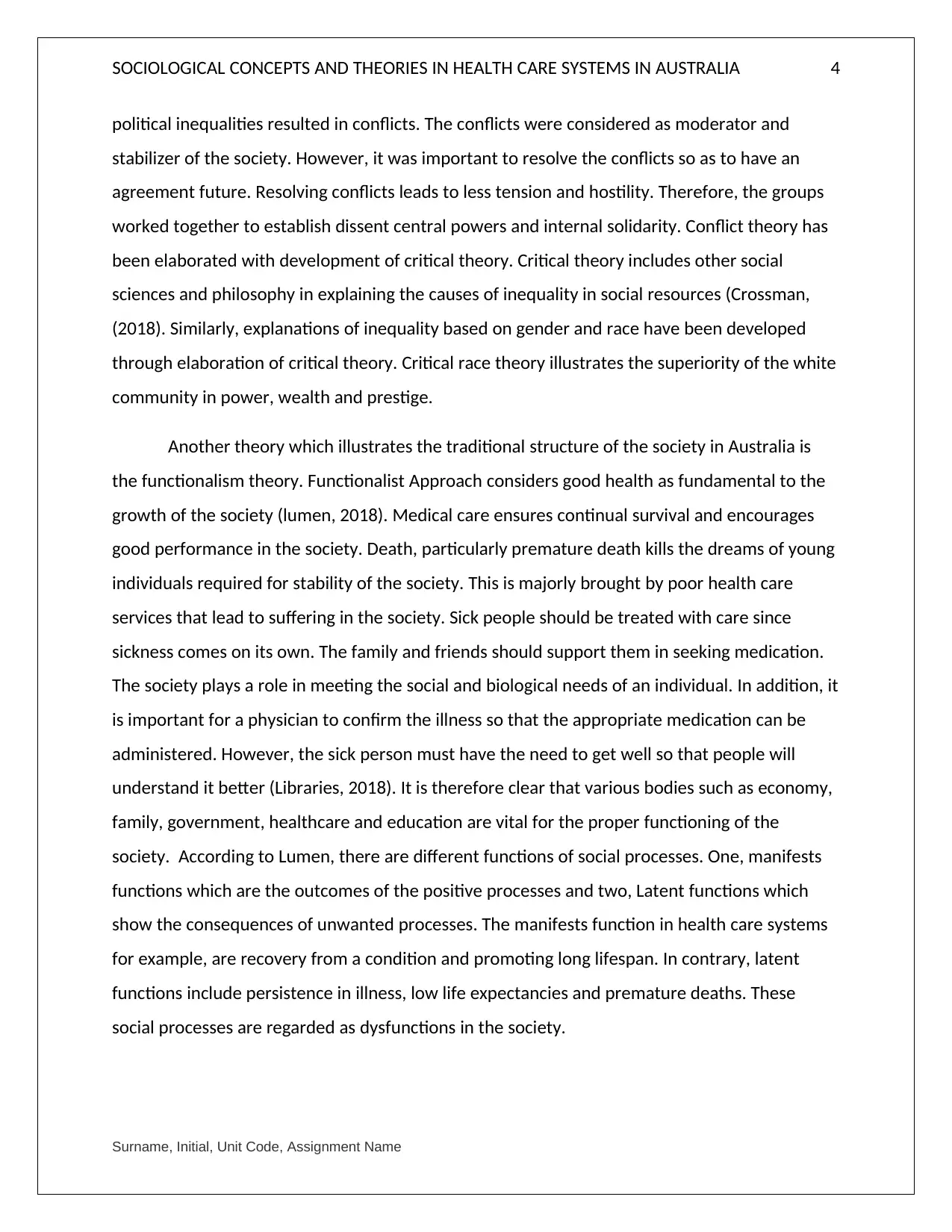
SOCIOLOGICAL CONCEPTS AND THEORIES IN HEALTH CARE SYSTEMS IN AUSTRALIA 4
political inequalities resulted in conflicts. The conflicts were considered as moderator and
stabilizer of the society. However, it was important to resolve the conflicts so as to have an
agreement future. Resolving conflicts leads to less tension and hostility. Therefore, the groups
worked together to establish dissent central powers and internal solidarity. Conflict theory has
been elaborated with development of critical theory. Critical theory includes other social
sciences and philosophy in explaining the causes of inequality in social resources (Crossman,
(2018). Similarly, explanations of inequality based on gender and race have been developed
through elaboration of critical theory. Critical race theory illustrates the superiority of the white
community in power, wealth and prestige.
Another theory which illustrates the traditional structure of the society in Australia is
the functionalism theory. Functionalist Approach considers good health as fundamental to the
growth of the society (lumen, 2018). Medical care ensures continual survival and encourages
good performance in the society. Death, particularly premature death kills the dreams of young
individuals required for stability of the society. This is majorly brought by poor health care
services that lead to suffering in the society. Sick people should be treated with care since
sickness comes on its own. The family and friends should support them in seeking medication.
The society plays a role in meeting the social and biological needs of an individual. In addition, it
is important for a physician to confirm the illness so that the appropriate medication can be
administered. However, the sick person must have the need to get well so that people will
understand it better (Libraries, 2018). It is therefore clear that various bodies such as economy,
family, government, healthcare and education are vital for the proper functioning of the
society. According to Lumen, there are different functions of social processes. One, manifests
functions which are the outcomes of the positive processes and two, Latent functions which
show the consequences of unwanted processes. The manifests function in health care systems
for example, are recovery from a condition and promoting long lifespan. In contrary, latent
functions include persistence in illness, low life expectancies and premature deaths. These
social processes are regarded as dysfunctions in the society.
Surname, Initial, Unit Code, Assignment Name
political inequalities resulted in conflicts. The conflicts were considered as moderator and
stabilizer of the society. However, it was important to resolve the conflicts so as to have an
agreement future. Resolving conflicts leads to less tension and hostility. Therefore, the groups
worked together to establish dissent central powers and internal solidarity. Conflict theory has
been elaborated with development of critical theory. Critical theory includes other social
sciences and philosophy in explaining the causes of inequality in social resources (Crossman,
(2018). Similarly, explanations of inequality based on gender and race have been developed
through elaboration of critical theory. Critical race theory illustrates the superiority of the white
community in power, wealth and prestige.
Another theory which illustrates the traditional structure of the society in Australia is
the functionalism theory. Functionalist Approach considers good health as fundamental to the
growth of the society (lumen, 2018). Medical care ensures continual survival and encourages
good performance in the society. Death, particularly premature death kills the dreams of young
individuals required for stability of the society. This is majorly brought by poor health care
services that lead to suffering in the society. Sick people should be treated with care since
sickness comes on its own. The family and friends should support them in seeking medication.
The society plays a role in meeting the social and biological needs of an individual. In addition, it
is important for a physician to confirm the illness so that the appropriate medication can be
administered. However, the sick person must have the need to get well so that people will
understand it better (Libraries, 2018). It is therefore clear that various bodies such as economy,
family, government, healthcare and education are vital for the proper functioning of the
society. According to Lumen, there are different functions of social processes. One, manifests
functions which are the outcomes of the positive processes and two, Latent functions which
show the consequences of unwanted processes. The manifests function in health care systems
for example, are recovery from a condition and promoting long lifespan. In contrary, latent
functions include persistence in illness, low life expectancies and premature deaths. These
social processes are regarded as dysfunctions in the society.
Surname, Initial, Unit Code, Assignment Name
Paraphrase This Document
Need a fresh take? Get an instant paraphrase of this document with our AI Paraphraser
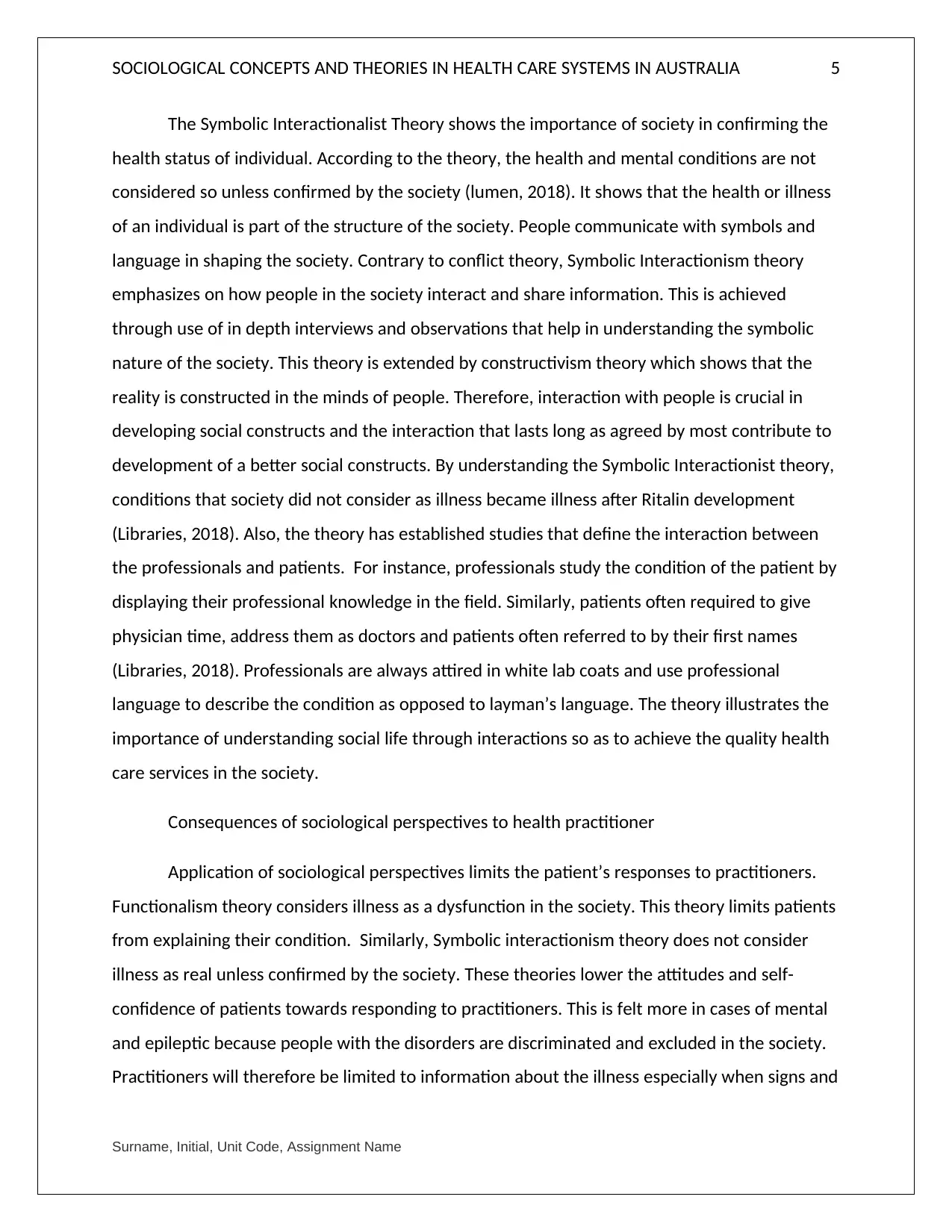
SOCIOLOGICAL CONCEPTS AND THEORIES IN HEALTH CARE SYSTEMS IN AUSTRALIA 5
The Symbolic Interactionalist Theory shows the importance of society in confirming the
health status of individual. According to the theory, the health and mental conditions are not
considered so unless confirmed by the society (lumen, 2018). It shows that the health or illness
of an individual is part of the structure of the society. People communicate with symbols and
language in shaping the society. Contrary to conflict theory, Symbolic Interactionism theory
emphasizes on how people in the society interact and share information. This is achieved
through use of in depth interviews and observations that help in understanding the symbolic
nature of the society. This theory is extended by constructivism theory which shows that the
reality is constructed in the minds of people. Therefore, interaction with people is crucial in
developing social constructs and the interaction that lasts long as agreed by most contribute to
development of a better social constructs. By understanding the Symbolic Interactionist theory,
conditions that society did not consider as illness became illness after Ritalin development
(Libraries, 2018). Also, the theory has established studies that define the interaction between
the professionals and patients. For instance, professionals study the condition of the patient by
displaying their professional knowledge in the field. Similarly, patients often required to give
physician time, address them as doctors and patients often referred to by their first names
(Libraries, 2018). Professionals are always attired in white lab coats and use professional
language to describe the condition as opposed to layman’s language. The theory illustrates the
importance of understanding social life through interactions so as to achieve the quality health
care services in the society.
Consequences of sociological perspectives to health practitioner
Application of sociological perspectives limits the patient’s responses to practitioners.
Functionalism theory considers illness as a dysfunction in the society. This theory limits patients
from explaining their condition. Similarly, Symbolic interactionism theory does not consider
illness as real unless confirmed by the society. These theories lower the attitudes and self-
confidence of patients towards responding to practitioners. This is felt more in cases of mental
and epileptic because people with the disorders are discriminated and excluded in the society.
Practitioners will therefore be limited to information about the illness especially when signs and
Surname, Initial, Unit Code, Assignment Name
The Symbolic Interactionalist Theory shows the importance of society in confirming the
health status of individual. According to the theory, the health and mental conditions are not
considered so unless confirmed by the society (lumen, 2018). It shows that the health or illness
of an individual is part of the structure of the society. People communicate with symbols and
language in shaping the society. Contrary to conflict theory, Symbolic Interactionism theory
emphasizes on how people in the society interact and share information. This is achieved
through use of in depth interviews and observations that help in understanding the symbolic
nature of the society. This theory is extended by constructivism theory which shows that the
reality is constructed in the minds of people. Therefore, interaction with people is crucial in
developing social constructs and the interaction that lasts long as agreed by most contribute to
development of a better social constructs. By understanding the Symbolic Interactionist theory,
conditions that society did not consider as illness became illness after Ritalin development
(Libraries, 2018). Also, the theory has established studies that define the interaction between
the professionals and patients. For instance, professionals study the condition of the patient by
displaying their professional knowledge in the field. Similarly, patients often required to give
physician time, address them as doctors and patients often referred to by their first names
(Libraries, 2018). Professionals are always attired in white lab coats and use professional
language to describe the condition as opposed to layman’s language. The theory illustrates the
importance of understanding social life through interactions so as to achieve the quality health
care services in the society.
Consequences of sociological perspectives to health practitioner
Application of sociological perspectives limits the patient’s responses to practitioners.
Functionalism theory considers illness as a dysfunction in the society. This theory limits patients
from explaining their condition. Similarly, Symbolic interactionism theory does not consider
illness as real unless confirmed by the society. These theories lower the attitudes and self-
confidence of patients towards responding to practitioners. This is felt more in cases of mental
and epileptic because people with the disorders are discriminated and excluded in the society.
Practitioners will therefore be limited to information about the illness especially when signs and
Surname, Initial, Unit Code, Assignment Name
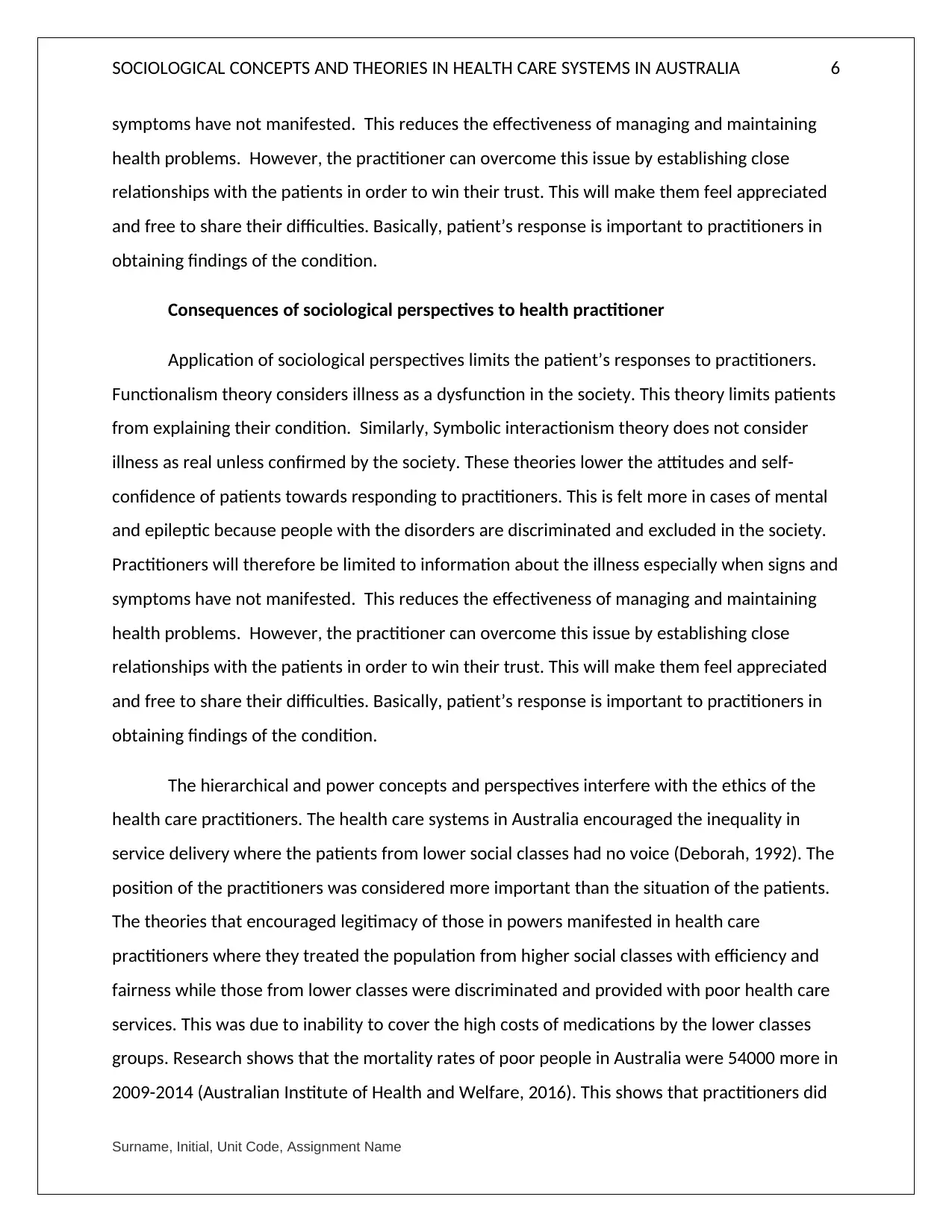
SOCIOLOGICAL CONCEPTS AND THEORIES IN HEALTH CARE SYSTEMS IN AUSTRALIA 6
symptoms have not manifested. This reduces the effectiveness of managing and maintaining
health problems. However, the practitioner can overcome this issue by establishing close
relationships with the patients in order to win their trust. This will make them feel appreciated
and free to share their difficulties. Basically, patient’s response is important to practitioners in
obtaining findings of the condition.
Consequences of sociological perspectives to health practitioner
Application of sociological perspectives limits the patient’s responses to practitioners.
Functionalism theory considers illness as a dysfunction in the society. This theory limits patients
from explaining their condition. Similarly, Symbolic interactionism theory does not consider
illness as real unless confirmed by the society. These theories lower the attitudes and self-
confidence of patients towards responding to practitioners. This is felt more in cases of mental
and epileptic because people with the disorders are discriminated and excluded in the society.
Practitioners will therefore be limited to information about the illness especially when signs and
symptoms have not manifested. This reduces the effectiveness of managing and maintaining
health problems. However, the practitioner can overcome this issue by establishing close
relationships with the patients in order to win their trust. This will make them feel appreciated
and free to share their difficulties. Basically, patient’s response is important to practitioners in
obtaining findings of the condition.
The hierarchical and power concepts and perspectives interfere with the ethics of the
health care practitioners. The health care systems in Australia encouraged the inequality in
service delivery where the patients from lower social classes had no voice (Deborah, 1992). The
position of the practitioners was considered more important than the situation of the patients.
The theories that encouraged legitimacy of those in powers manifested in health care
practitioners where they treated the population from higher social classes with efficiency and
fairness while those from lower classes were discriminated and provided with poor health care
services. This was due to inability to cover the high costs of medications by the lower classes
groups. Research shows that the mortality rates of poor people in Australia were 54000 more in
2009-2014 (Australian Institute of Health and Welfare, 2016). This shows that practitioners did
Surname, Initial, Unit Code, Assignment Name
symptoms have not manifested. This reduces the effectiveness of managing and maintaining
health problems. However, the practitioner can overcome this issue by establishing close
relationships with the patients in order to win their trust. This will make them feel appreciated
and free to share their difficulties. Basically, patient’s response is important to practitioners in
obtaining findings of the condition.
Consequences of sociological perspectives to health practitioner
Application of sociological perspectives limits the patient’s responses to practitioners.
Functionalism theory considers illness as a dysfunction in the society. This theory limits patients
from explaining their condition. Similarly, Symbolic interactionism theory does not consider
illness as real unless confirmed by the society. These theories lower the attitudes and self-
confidence of patients towards responding to practitioners. This is felt more in cases of mental
and epileptic because people with the disorders are discriminated and excluded in the society.
Practitioners will therefore be limited to information about the illness especially when signs and
symptoms have not manifested. This reduces the effectiveness of managing and maintaining
health problems. However, the practitioner can overcome this issue by establishing close
relationships with the patients in order to win their trust. This will make them feel appreciated
and free to share their difficulties. Basically, patient’s response is important to practitioners in
obtaining findings of the condition.
The hierarchical and power concepts and perspectives interfere with the ethics of the
health care practitioners. The health care systems in Australia encouraged the inequality in
service delivery where the patients from lower social classes had no voice (Deborah, 1992). The
position of the practitioners was considered more important than the situation of the patients.
The theories that encouraged legitimacy of those in powers manifested in health care
practitioners where they treated the population from higher social classes with efficiency and
fairness while those from lower classes were discriminated and provided with poor health care
services. This was due to inability to cover the high costs of medications by the lower classes
groups. Research shows that the mortality rates of poor people in Australia were 54000 more in
2009-2014 (Australian Institute of Health and Welfare, 2016). This shows that practitioners did
Surname, Initial, Unit Code, Assignment Name
⊘ This is a preview!⊘
Do you want full access?
Subscribe today to unlock all pages.

Trusted by 1+ million students worldwide
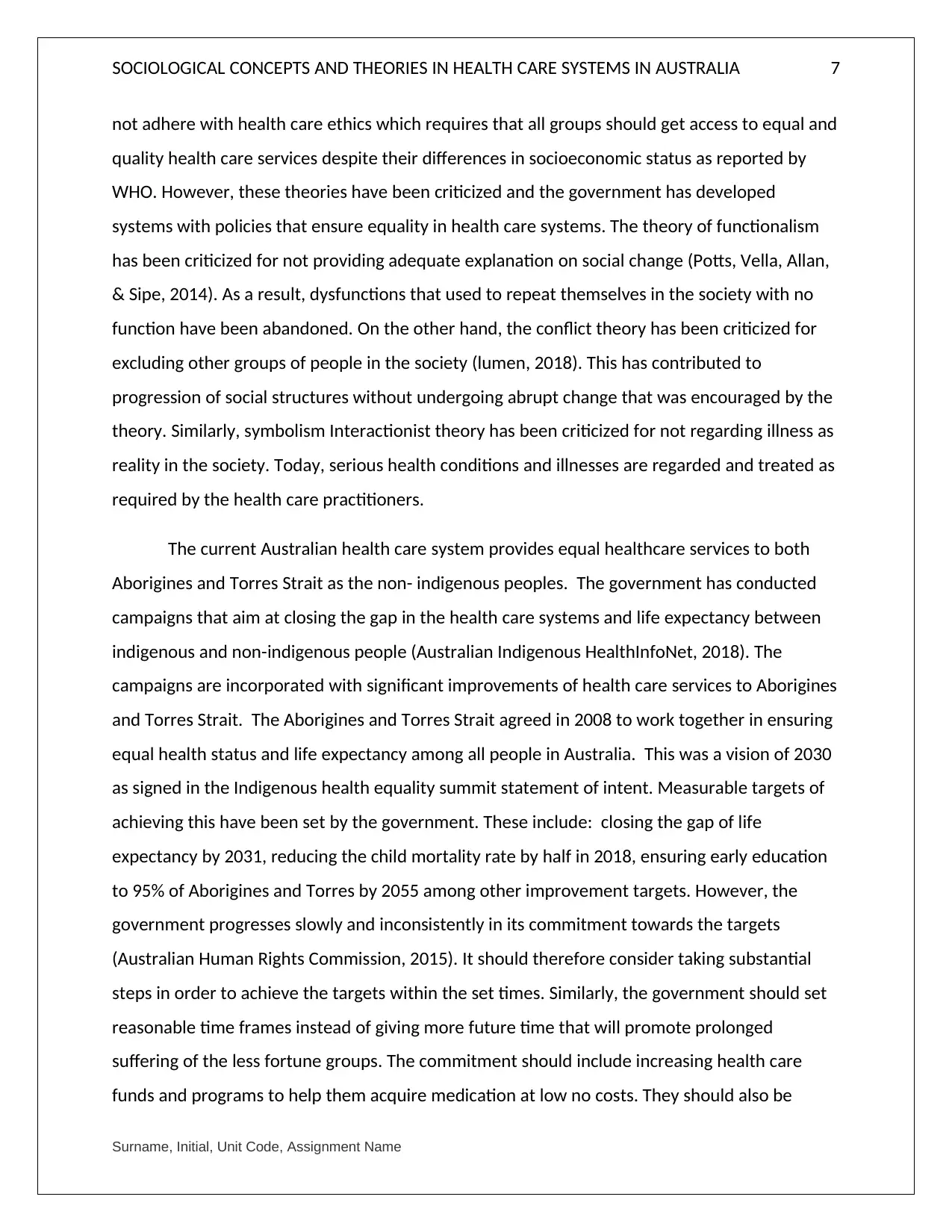
SOCIOLOGICAL CONCEPTS AND THEORIES IN HEALTH CARE SYSTEMS IN AUSTRALIA 7
not adhere with health care ethics which requires that all groups should get access to equal and
quality health care services despite their differences in socioeconomic status as reported by
WHO. However, these theories have been criticized and the government has developed
systems with policies that ensure equality in health care systems. The theory of functionalism
has been criticized for not providing adequate explanation on social change (Potts, Vella, Allan,
& Sipe, 2014). As a result, dysfunctions that used to repeat themselves in the society with no
function have been abandoned. On the other hand, the conflict theory has been criticized for
excluding other groups of people in the society (lumen, 2018). This has contributed to
progression of social structures without undergoing abrupt change that was encouraged by the
theory. Similarly, symbolism Interactionist theory has been criticized for not regarding illness as
reality in the society. Today, serious health conditions and illnesses are regarded and treated as
required by the health care practitioners.
The current Australian health care system provides equal healthcare services to both
Aborigines and Torres Strait as the non- indigenous peoples. The government has conducted
campaigns that aim at closing the gap in the health care systems and life expectancy between
indigenous and non-indigenous people (Australian Indigenous HealthInfoNet, 2018). The
campaigns are incorporated with significant improvements of health care services to Aborigines
and Torres Strait. The Aborigines and Torres Strait agreed in 2008 to work together in ensuring
equal health status and life expectancy among all people in Australia. This was a vision of 2030
as signed in the Indigenous health equality summit statement of intent. Measurable targets of
achieving this have been set by the government. These include: closing the gap of life
expectancy by 2031, reducing the child mortality rate by half in 2018, ensuring early education
to 95% of Aborigines and Torres by 2055 among other improvement targets. However, the
government progresses slowly and inconsistently in its commitment towards the targets
(Australian Human Rights Commission, 2015). It should therefore consider taking substantial
steps in order to achieve the targets within the set times. Similarly, the government should set
reasonable time frames instead of giving more future time that will promote prolonged
suffering of the less fortune groups. The commitment should include increasing health care
funds and programs to help them acquire medication at low no costs. They should also be
Surname, Initial, Unit Code, Assignment Name
not adhere with health care ethics which requires that all groups should get access to equal and
quality health care services despite their differences in socioeconomic status as reported by
WHO. However, these theories have been criticized and the government has developed
systems with policies that ensure equality in health care systems. The theory of functionalism
has been criticized for not providing adequate explanation on social change (Potts, Vella, Allan,
& Sipe, 2014). As a result, dysfunctions that used to repeat themselves in the society with no
function have been abandoned. On the other hand, the conflict theory has been criticized for
excluding other groups of people in the society (lumen, 2018). This has contributed to
progression of social structures without undergoing abrupt change that was encouraged by the
theory. Similarly, symbolism Interactionist theory has been criticized for not regarding illness as
reality in the society. Today, serious health conditions and illnesses are regarded and treated as
required by the health care practitioners.
The current Australian health care system provides equal healthcare services to both
Aborigines and Torres Strait as the non- indigenous peoples. The government has conducted
campaigns that aim at closing the gap in the health care systems and life expectancy between
indigenous and non-indigenous people (Australian Indigenous HealthInfoNet, 2018). The
campaigns are incorporated with significant improvements of health care services to Aborigines
and Torres Strait. The Aborigines and Torres Strait agreed in 2008 to work together in ensuring
equal health status and life expectancy among all people in Australia. This was a vision of 2030
as signed in the Indigenous health equality summit statement of intent. Measurable targets of
achieving this have been set by the government. These include: closing the gap of life
expectancy by 2031, reducing the child mortality rate by half in 2018, ensuring early education
to 95% of Aborigines and Torres by 2055 among other improvement targets. However, the
government progresses slowly and inconsistently in its commitment towards the targets
(Australian Human Rights Commission, 2015). It should therefore consider taking substantial
steps in order to achieve the targets within the set times. Similarly, the government should set
reasonable time frames instead of giving more future time that will promote prolonged
suffering of the less fortune groups. The commitment should include increasing health care
funds and programs to help them acquire medication at low no costs. They should also be
Surname, Initial, Unit Code, Assignment Name
Paraphrase This Document
Need a fresh take? Get an instant paraphrase of this document with our AI Paraphraser
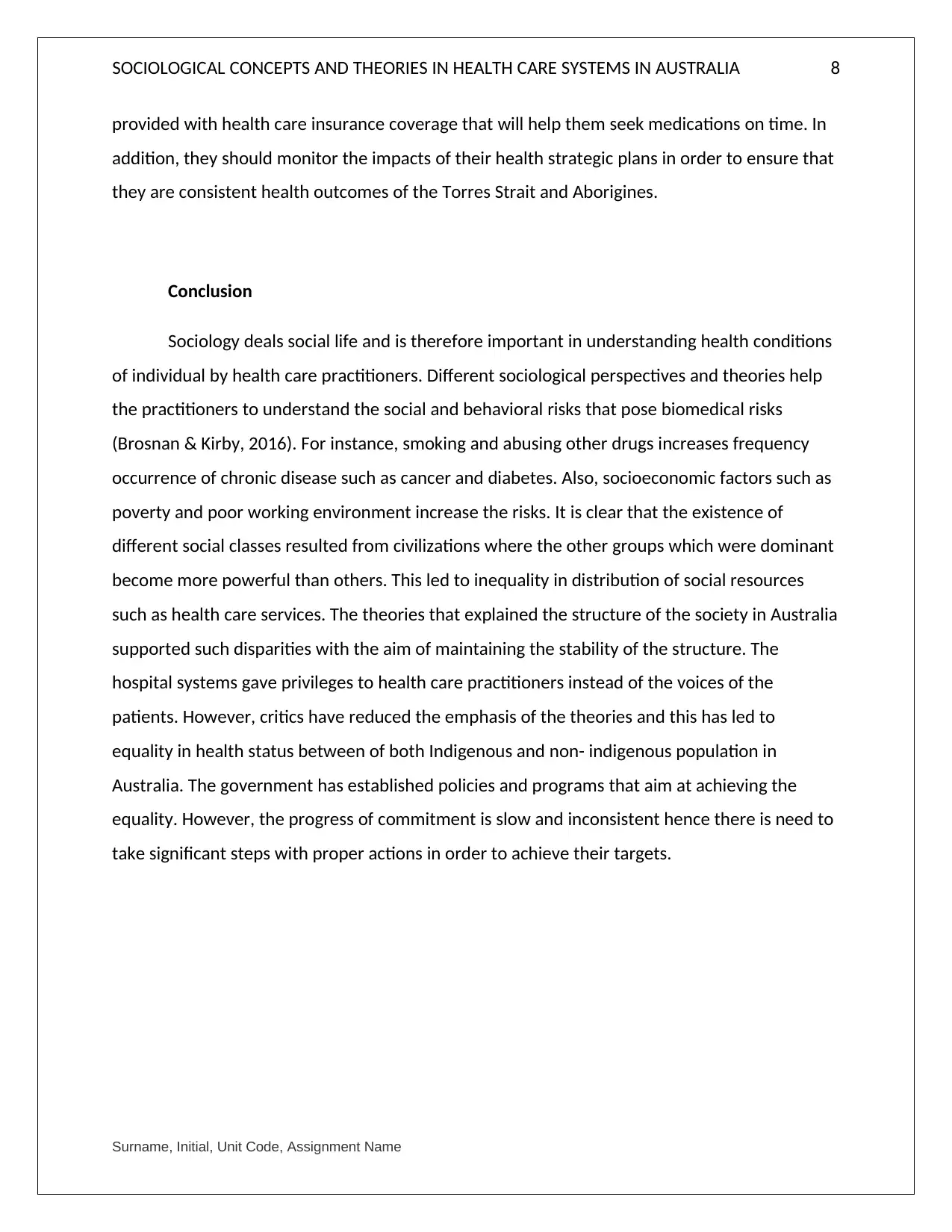
SOCIOLOGICAL CONCEPTS AND THEORIES IN HEALTH CARE SYSTEMS IN AUSTRALIA 8
provided with health care insurance coverage that will help them seek medications on time. In
addition, they should monitor the impacts of their health strategic plans in order to ensure that
they are consistent health outcomes of the Torres Strait and Aborigines.
Conclusion
Sociology deals social life and is therefore important in understanding health conditions
of individual by health care practitioners. Different sociological perspectives and theories help
the practitioners to understand the social and behavioral risks that pose biomedical risks
(Brosnan & Kirby, 2016). For instance, smoking and abusing other drugs increases frequency
occurrence of chronic disease such as cancer and diabetes. Also, socioeconomic factors such as
poverty and poor working environment increase the risks. It is clear that the existence of
different social classes resulted from civilizations where the other groups which were dominant
become more powerful than others. This led to inequality in distribution of social resources
such as health care services. The theories that explained the structure of the society in Australia
supported such disparities with the aim of maintaining the stability of the structure. The
hospital systems gave privileges to health care practitioners instead of the voices of the
patients. However, critics have reduced the emphasis of the theories and this has led to
equality in health status between of both Indigenous and non- indigenous population in
Australia. The government has established policies and programs that aim at achieving the
equality. However, the progress of commitment is slow and inconsistent hence there is need to
take significant steps with proper actions in order to achieve their targets.
Surname, Initial, Unit Code, Assignment Name
provided with health care insurance coverage that will help them seek medications on time. In
addition, they should monitor the impacts of their health strategic plans in order to ensure that
they are consistent health outcomes of the Torres Strait and Aborigines.
Conclusion
Sociology deals social life and is therefore important in understanding health conditions
of individual by health care practitioners. Different sociological perspectives and theories help
the practitioners to understand the social and behavioral risks that pose biomedical risks
(Brosnan & Kirby, 2016). For instance, smoking and abusing other drugs increases frequency
occurrence of chronic disease such as cancer and diabetes. Also, socioeconomic factors such as
poverty and poor working environment increase the risks. It is clear that the existence of
different social classes resulted from civilizations where the other groups which were dominant
become more powerful than others. This led to inequality in distribution of social resources
such as health care services. The theories that explained the structure of the society in Australia
supported such disparities with the aim of maintaining the stability of the structure. The
hospital systems gave privileges to health care practitioners instead of the voices of the
patients. However, critics have reduced the emphasis of the theories and this has led to
equality in health status between of both Indigenous and non- indigenous population in
Australia. The government has established policies and programs that aim at achieving the
equality. However, the progress of commitment is slow and inconsistent hence there is need to
take significant steps with proper actions in order to achieve their targets.
Surname, Initial, Unit Code, Assignment Name
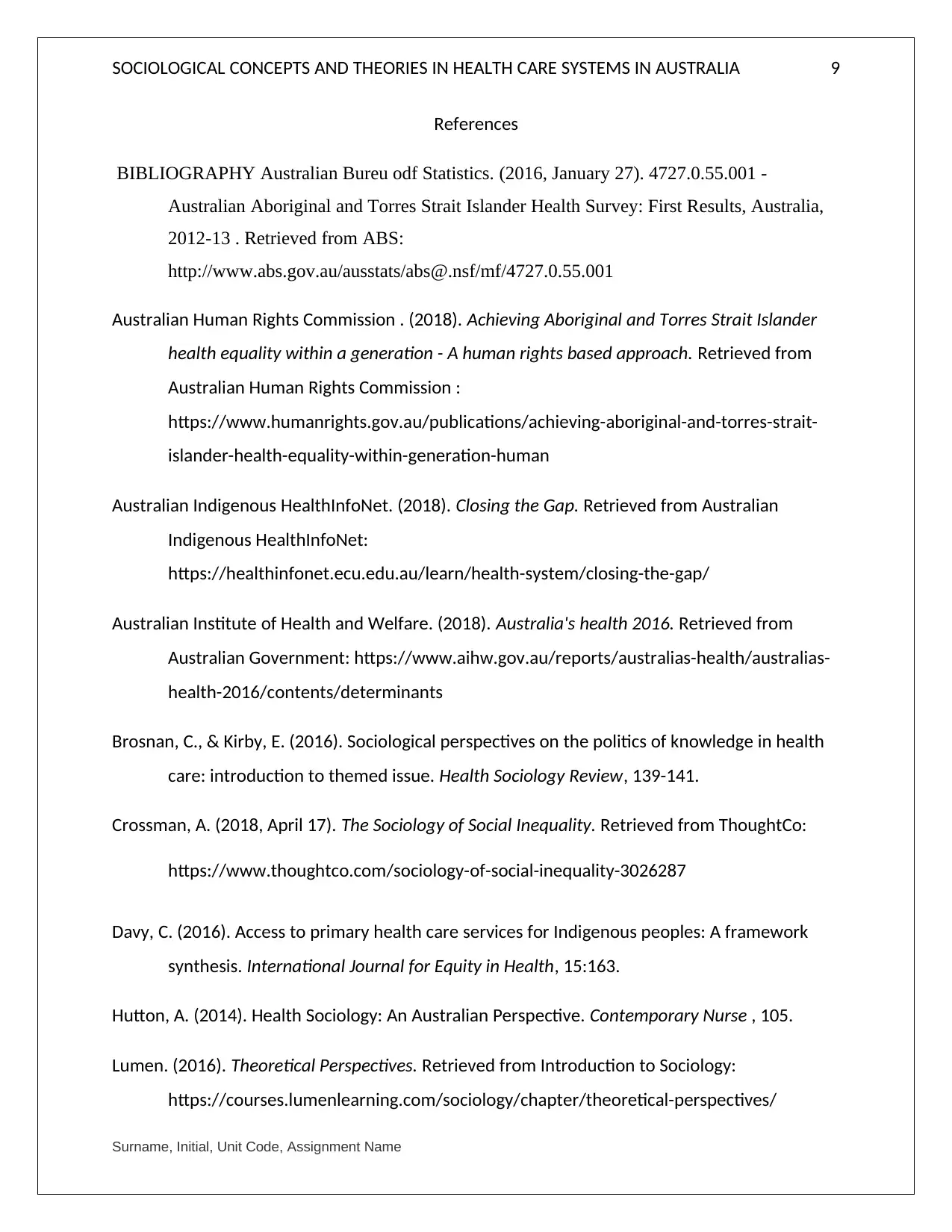
SOCIOLOGICAL CONCEPTS AND THEORIES IN HEALTH CARE SYSTEMS IN AUSTRALIA 9
References
BIBLIOGRAPHY Australian Bureu odf Statistics. (2016, January 27). 4727.0.55.001 -
Australian Aboriginal and Torres Strait Islander Health Survey: First Results, Australia,
2012-13 . Retrieved from ABS:
http://www.abs.gov.au/ausstats/abs@.nsf/mf/4727.0.55.001
Australian Human Rights Commission . (2018). Achieving Aboriginal and Torres Strait Islander
health equality within a generation - A human rights based approach. Retrieved from
Australian Human Rights Commission :
https://www.humanrights.gov.au/publications/achieving-aboriginal-and-torres-strait-
islander-health-equality-within-generation-human
Australian Indigenous HealthInfoNet. (2018). Closing the Gap. Retrieved from Australian
Indigenous HealthInfoNet:
https://healthinfonet.ecu.edu.au/learn/health-system/closing-the-gap/
Australian Institute of Health and Welfare. (2018). Australia's health 2016. Retrieved from
Australian Government: https://www.aihw.gov.au/reports/australias-health/australias-
health-2016/contents/determinants
Brosnan, C., & Kirby, E. (2016). Sociological perspectives on the politics of knowledge in health
care: introduction to themed issue. Health Sociology Review, 139-141.
Crossman, A. (2018, April 17). The Sociology of Social Inequality. Retrieved from ThoughtCo:
https://www.thoughtco.com/sociology-of-social-inequality-3026287
Davy, C. (2016). Access to primary health care services for Indigenous peoples: A framework
synthesis. International Journal for Equity in Health, 15:163.
Hutton, A. (2014). Health Sociology: An Australian Perspective. Contemporary Nurse , 105.
Lumen. (2016). Theoretical Perspectives. Retrieved from Introduction to Sociology:
https://courses.lumenlearning.com/sociology/chapter/theoretical-perspectives/
Surname, Initial, Unit Code, Assignment Name
References
BIBLIOGRAPHY Australian Bureu odf Statistics. (2016, January 27). 4727.0.55.001 -
Australian Aboriginal and Torres Strait Islander Health Survey: First Results, Australia,
2012-13 . Retrieved from ABS:
http://www.abs.gov.au/ausstats/abs@.nsf/mf/4727.0.55.001
Australian Human Rights Commission . (2018). Achieving Aboriginal and Torres Strait Islander
health equality within a generation - A human rights based approach. Retrieved from
Australian Human Rights Commission :
https://www.humanrights.gov.au/publications/achieving-aboriginal-and-torres-strait-
islander-health-equality-within-generation-human
Australian Indigenous HealthInfoNet. (2018). Closing the Gap. Retrieved from Australian
Indigenous HealthInfoNet:
https://healthinfonet.ecu.edu.au/learn/health-system/closing-the-gap/
Australian Institute of Health and Welfare. (2018). Australia's health 2016. Retrieved from
Australian Government: https://www.aihw.gov.au/reports/australias-health/australias-
health-2016/contents/determinants
Brosnan, C., & Kirby, E. (2016). Sociological perspectives on the politics of knowledge in health
care: introduction to themed issue. Health Sociology Review, 139-141.
Crossman, A. (2018, April 17). The Sociology of Social Inequality. Retrieved from ThoughtCo:
https://www.thoughtco.com/sociology-of-social-inequality-3026287
Davy, C. (2016). Access to primary health care services for Indigenous peoples: A framework
synthesis. International Journal for Equity in Health, 15:163.
Hutton, A. (2014). Health Sociology: An Australian Perspective. Contemporary Nurse , 105.
Lumen. (2016). Theoretical Perspectives. Retrieved from Introduction to Sociology:
https://courses.lumenlearning.com/sociology/chapter/theoretical-perspectives/
Surname, Initial, Unit Code, Assignment Name
⊘ This is a preview!⊘
Do you want full access?
Subscribe today to unlock all pages.

Trusted by 1+ million students worldwide
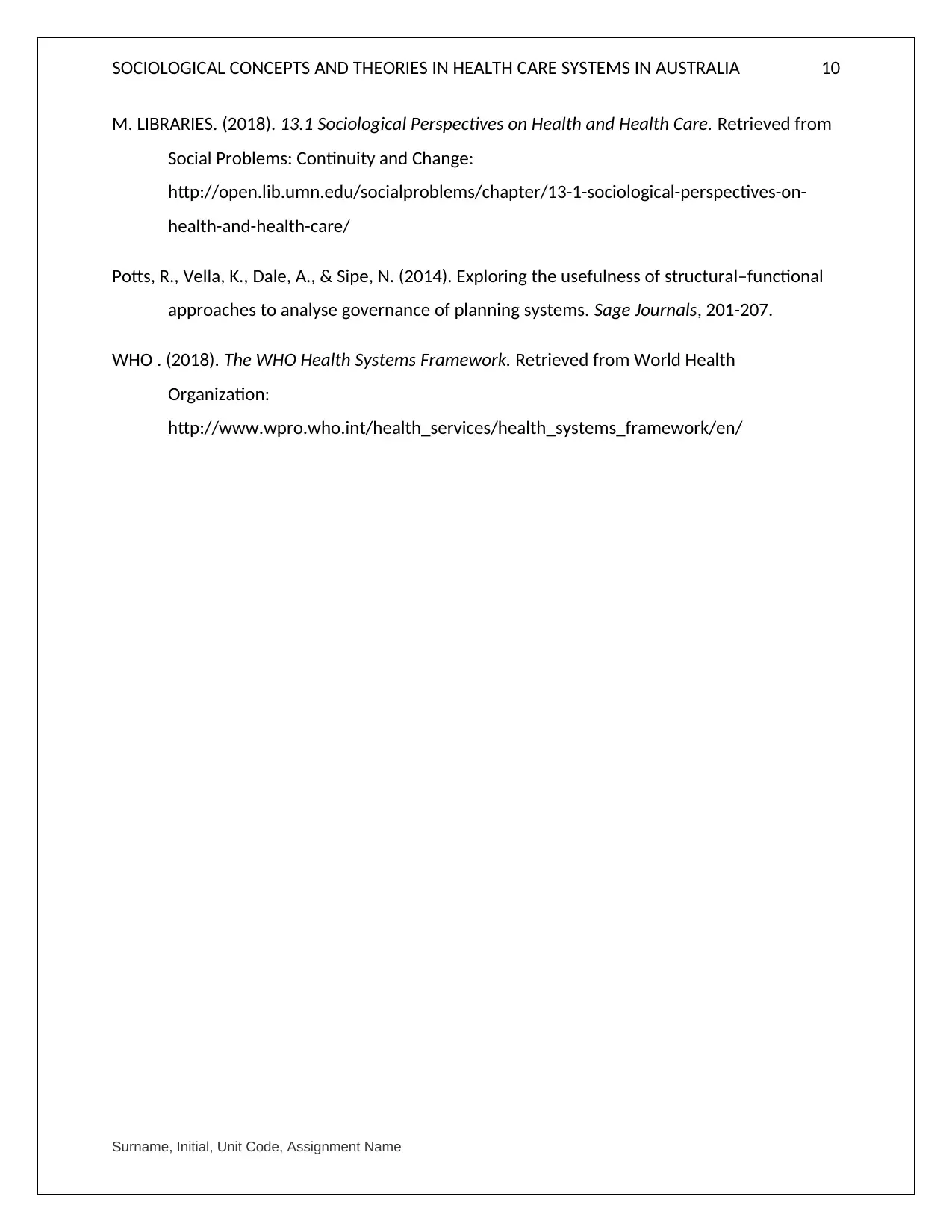
SOCIOLOGICAL CONCEPTS AND THEORIES IN HEALTH CARE SYSTEMS IN AUSTRALIA 10
M. LIBRARIES. (2018). 13.1 Sociological Perspectives on Health and Health Care. Retrieved from
Social Problems: Continuity and Change:
http://open.lib.umn.edu/socialproblems/chapter/13-1-sociological-perspectives-on-
health-and-health-care/
Potts, R., Vella, K., Dale, A., & Sipe, N. (2014). Exploring the usefulness of structural–functional
approaches to analyse governance of planning systems. Sage Journals, 201-207.
WHO . (2018). The WHO Health Systems Framework. Retrieved from World Health
Organization:
http://www.wpro.who.int/health_services/health_systems_framework/en/
Surname, Initial, Unit Code, Assignment Name
M. LIBRARIES. (2018). 13.1 Sociological Perspectives on Health and Health Care. Retrieved from
Social Problems: Continuity and Change:
http://open.lib.umn.edu/socialproblems/chapter/13-1-sociological-perspectives-on-
health-and-health-care/
Potts, R., Vella, K., Dale, A., & Sipe, N. (2014). Exploring the usefulness of structural–functional
approaches to analyse governance of planning systems. Sage Journals, 201-207.
WHO . (2018). The WHO Health Systems Framework. Retrieved from World Health
Organization:
http://www.wpro.who.int/health_services/health_systems_framework/en/
Surname, Initial, Unit Code, Assignment Name
1 out of 10
Related Documents
Your All-in-One AI-Powered Toolkit for Academic Success.
+13062052269
info@desklib.com
Available 24*7 on WhatsApp / Email
![[object Object]](/_next/static/media/star-bottom.7253800d.svg)
Unlock your academic potential
Copyright © 2020–2026 A2Z Services. All Rights Reserved. Developed and managed by ZUCOL.




